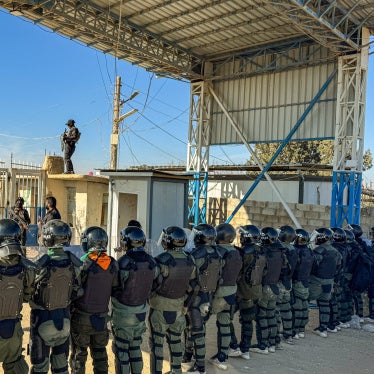His Excellency Sheikh Khalid bin Ahmed bin Mohamed Al Khalifa
Minister of Foreign Affairs
Kingdom of Bahrain
Your Excellency,
For several months now, Human Rights Watch has monitored the situation of foreign residents who have been prevented from leaving Bahrain, and in at least some cases from legally working and earning a livelihood in Bahrain, as a result of personal or business debt they allegedly accrued with Bahraini or Bahrain-based financial institutions and creditors. In at least one case, Human Rights Watch is aware of the imprisonment of a person who alleged he had been imprisoned because he could not repay his debts.
We are concerned that these policies may constitute a violation of articles 11 and 12 of the International Covenant on Civil and Political Rights (ICCPR). Article 11 states that “No one shall be imprisoned merely on the ground of inability to fulfill a contractual obligation.” Article 12 states that “Everyone shall be free to leave any country, including his own,” subject only to restrictions that are “provided by law, are necessary in order to protect national security, public order (ordre public), public health or morals, or the rights and freedoms of others,” In addition, article 6 of the International Covenant on Economic, Social, and Cultural Rights (ICESCR) protects “the right of everyone to the opportunity to gain his living by work which he freely chooses or accepts… .”
The combined violation of these rights impinges on other rights as well, including the right to an adequate standard of living (ICESR article 11) and the enjoyment of the highest attainable standard of physical and mental health (ICESR article 12).
According to Human Rights Watch’s understanding, creditors may apply to civil courts for travel bans in order to prevent individuals from leaving the country unless they repay their outstanding debts. We understand that at the present time more than 25 individuals find themselves prohibited from leaving Bahrain for debt-related reasons.
Some of the foreign residents affected have told Human Rights Watch that the imposition of a travel ban also prevents them from renewing their residency and work permits with Bahraini authorities. As a result they have not only been deprived of the ability to leave Bahrain, but they are also prevented from lawfully working and earning money to afford basic necessities and pay off their debts.
In the cases documented by Human Rights Watch, the foreign residents affected by these travel bans had been living and working in Bahrain lawfully prior to receiving their travel bans. Most do not challenge the claim that they have accrued personal or business debt, and assert that they want to repay their creditors but cannot because they are no longer allowed to work in Bahrain or leave to work elsewhere. As you can imagine, the imposition of a travel ban, coupled with the inability to secure residency/work permits, has caused many of these individuals severe financial and personal hardship.
At least one individual who met with Human Rights Watch said that authorities had imprisoned him for approximately two months because of his failure to repay his creditors. The debtor told Human Rights Watch that his imprisonment, which occurred in 2009 and 2010, was ordered by a judge following court sessions during which he had little or no legal representation.
In light of the information received by Human Rights Watch, we would like to raise the following questions so that we can better understand the situation of foreign resident debtors allegedly affected by these travel bans:
- Which individuals or institutions (i.e. either private or government) are able under Bahraini law to initiate the process which ultimately leads to the issuing of a travel ban against a foreign resident debtor?
- Which institution(s) (i.e. civil courts, administrative bodies, private banks) have the authority under Bahraini law to issue travel bans against foreign resident debtors? What criteria do these institutions use to determine whether foreign resident debtors can or should receive travel bans?
- Which institution(s) enforce travel bans against foreign resident debtors?
- Please explain the legal and administrative process required before authorities can remove a travel ban against a foreign resident debtor.
- Are foreign residents notified prior to the issuing of a travel ban against them?
- Do foreign residents have the opportunity to contest the issuing of such bans at a judicial or administrative hearing prior to such bans taking effect?
- Do foreign residents affected by travel bans have the opportunity to challenge these bans at a judicial or administrative hearing after they have been issued?
- Does Bahraini law prohibit, limit, or otherwise hinder the issuing or renewal of residency and/or work permits for foreign residents who have had travel bans imposed on them? If so, please provide the Bahraini laws or regulations that apply.
- Have any foreign residents been arrested and/or detained solely for not having paid outstanding debts to creditors in Bahrain? If so, how many have been arrested or detained, and under what authority or law?
- How many foreign resident debtors have been arrested and/or detained as a result of their failure to repay debts owed to Bahraini creditors? How many individuals are currently being detained as a result of their failure to repay debts owed to Bahraini creditors?
How many foreign resident debtors are currently affected by travel bans? Of these individuals, how many have been unable to renew their residency and/or work permits ?
We look forward to your response at your earliest convenience, in order that we may reflect the view of the government in any public statement we make on this matter.
Sincerely,
Sarah Leah Whiston
Executive Director
Middle East and North Africa Division








